SWEDISH SOUTH ASIAN STUDIES NETWORK
Iranian Languages, Section for Asian and African Languages and Cultures; Department of Linguistics and Philology, Uppsala University
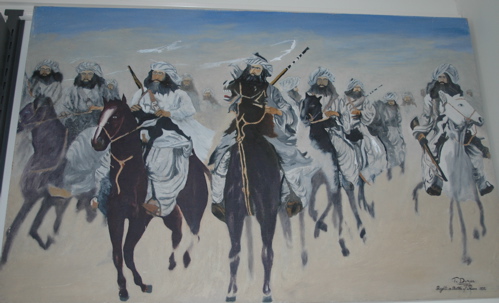 Postal
address: Asiatiska och afrikanska språk och kulturer, Institutionen
för lingvistik och filologi,
Postal
address: Asiatiska och afrikanska språk och kulturer, Institutionen
för lingvistik och filologi,
Box 635, SE-751 26 Uppsala, Sweden
Visiting address: Engelska parken, Humanistiskt centrum, Thunbergsvägen
3 H, Hus 9, 3 trappor
Web page: http://www.lingfil.uu.se/forskning/iranska/
Contact persons: Professor Carina Jahani, phone +46 (0)18 471 7869
The study of Iranian languages includes one of the major languages of Afghanistan, Dari. Courses are sometimes also held in Pashto and Balochi, other languages spoken in Pakistan and Afghanistan (and Balochi also in Iran). The perspective of philological studies has also been widened to include regional studies on the basis of languages. The sub-section of Iranian Languages since 2004 belongs to the Department of Linguistics and Philology. Within its section for Asian and African Languages and Cultures (including such diverse subjects as Swahili, Assyriology and Chinese) two sub-sections deal with education and research connected to South Asia. The other one is the sub-section for South Asian Languages and Cultures (with courses on Hindi, Indology and Tamil, besides running a Masters Programme for South Asian Studies).
Within the realia courses on A- and C-level (arranged during the Fall semesters) the section for Iranian Languages includes studies on the culture and history of Afghanistan. On the D-level run during 2010-2011 (more information), a course in Dari and Tajik languages is included.
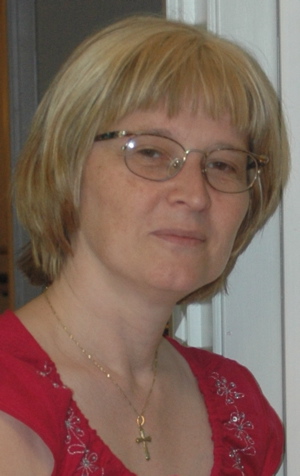 Professor
Carina Jahani (photo
to the left) defended her doctoral dissertation in 1989 on ”Standardization
and Orthography in the Balochi Language” and has
since been very active in research on the language. She is one of the
World’s leading experts in the field. She became Professor at the
department in 2004, after the retirement of Bo Utas.
Professor
Carina Jahani (photo
to the left) defended her doctoral dissertation in 1989 on ”Standardization
and Orthography in the Balochi Language” and has
since been very active in research on the language. She is one of the
World’s leading experts in the field. She became Professor at the
department in 2004, after the retirement of Bo Utas.
Two International Symposia focused on Balochistan have been held at the
department, in 1997 and 2000, resulting in two books – ”Language
in Society – Eight Sociolinguistic Essays on Balochi”,
edited by Carina Jahani (Acta Universitatis Upsaliensis, Studia Iranica
Upsaliensia, 3, Uppsala 2000); and ”The Baloch and Their Neighbours:
Ethnic and Linguistic Contact in Balochistan in Historical and Modern
Times”, edited by Carina Jahani and Agnes Korn (published by
Reichert, Wiesbaden 2003).
A third International Conference on Balochistan was arranged by the Iranian Languages division 18–21 August 2005. The theme for the 2005 conference was ”Pluralism in Balochistan”, and it wanted to highlight various aspects of plurality in presentday Balochistan (nowadays divided between Iran, Pakistan and Afghanistan). Researchers presented papers on the conference with a focus on socioeconomic, religious, linguistic, literary and cultural plurality in Balochistan. The conference was jointly organised by Prof. Carina Jahani at the Iranian Studies Division; and Dr. Agnes Korn from Vergleichende Sprachwissenschaft, Universität Frankfurt, Germany. The conference was held in Ihresalen, Humanistiskt centrum, Uppsala. More information
Professor emeritus Bo
Utas is a scholar specialised on Persian culture and
languages. Within this field he has studied Afghanistan for several decades,
and in the 1960’s and 1970’s he travelled extensively in the
country every year. He was a witness to the 1978 coup d’etat, and
over the years written many scholarly articles on Afghanistan in Swedish
and International magazines such as the Afghanistan Journal, Acta Orientalia,
Journal of Afghan Affairs, Orientaliska Studier, Internationella studier,
Sydasienbulletinen, and Afghanistan-nytt.
He has also taken part in several conferences on the situation in Afghanistan,
such as the International Seminar on Social and Cultural Prospects for
Afghanistan, held in Peshawar, Pakistan, 20–21 March 1990, and contributed
with papers for several books. An article on “Iran, Afghanistan
and Tajikistan”, appears in ”Islam outside the Arab world”;
and an article on “The Naqshbandiyya of Afghanistan on the eve of
the 1978 coup d’état”, in ”Naqshbandis in
Western and Central Asia. Change and continuity” (both books
published by Curzon Press, London, in 1999).
Between 1999 and 2006, Prof. Utas collaborated in a research project
run by the Department
of Oriental Languages at Stockholm University (but with shared responsibility
by several universities in Sweden). As part of a major comparative research
project on ”Literature and Literary
History in Global Contexts” Bo Utas was a member
of the Working group 2, focusing on ”Literary genres: an intercultural
approach”. The project was funded by the Swedish Research Council. In late 2006, the project finally
materialised in a set of four volumes being published by Walter de Gruyter
in Berlin & New York. In Volume No. 2, Prof. Utas has written
an article titled ”Genres in
Persian literature 900-1900”. More
information.
The 1st International Conference on Languages and Dialects in Iran will be held in Zahedan, Iran, 28–31 October 2008. The conference is jointly organised by the Dept. of English and Linguistics, University of Sistan and Baluchestan in Zahedan, and Dept. of Linguistics and Philology at Uppsala University. Prof. Carina Jahani is a member of the scientific committee preparing the conference, and Prof. Emeritus Bo Utas will be one of the plenary speakers. The purpose of the conference is to stimulate linguistic research in Iran by creating a network of field linguists interested in the study of languages and dialects in Iran in their sociolinguistic milieu. More information. ![]()

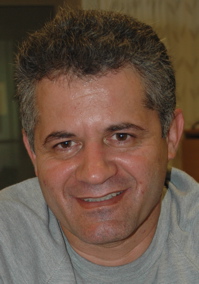 PhD
Farid Abbaszadegan
(photo to the left) has been doing research on Politics, History
and Islam in Central Asia and the Caucasus, especially in Afghanistan
and Iran. Along with Prof. Utas he edited a volume in 1995 on ”Centralasien
– gamla folk söker ny väg (Central Asia – ancient
peoples seeking a new route)”, published by the Society for
Asian Studies in Uppsala.
PhD
Farid Abbaszadegan
(photo to the left) has been doing research on Politics, History
and Islam in Central Asia and the Caucasus, especially in Afghanistan
and Iran. Along with Prof. Utas he edited a volume in 1995 on ”Centralasien
– gamla folk söker ny väg (Central Asia – ancient
peoples seeking a new route)”, published by the Society for
Asian Studies in Uppsala.
PhD candidate Behrooz Barjasteh Delforooz (photo to the right) has studied and written about the life of Gulshan Nasir, famous Baluchi poet who passed away in Pakistan in 1973. Delforooz is now working on a doctoral project related to the Brahui language, spoken by a camel-breeding people in the region of Seistan, in Iran, Pakistan and Afghanistan.
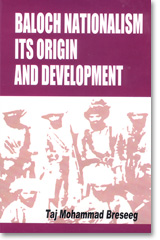 Dr. Taj
Mohammad Breseeg, now living in Stockholm,
defended his doctoral dissertation titled ”Baloch
Nationalism: Its Origin and Development”
at the School of Oriental and African Studies, London, in 2001. It was
intended to fill in a void in the literature pertaining to the Baloch
by presenting as complete a picture of the Baloch problem as possible
in the present condition of research, applying existing nationalism theory
to the Baloch. By examining hitherto unexplored evidence
that traces the roots of Baloch nationalism to the colonial era, the
dissertation has tried to push the frontier of enquiry in this subject
beyond its familiar limits.
Dr. Taj
Mohammad Breseeg, now living in Stockholm,
defended his doctoral dissertation titled ”Baloch
Nationalism: Its Origin and Development”
at the School of Oriental and African Studies, London, in 2001. It was
intended to fill in a void in the literature pertaining to the Baloch
by presenting as complete a picture of the Baloch problem as possible
in the present condition of research, applying existing nationalism theory
to the Baloch. By examining hitherto unexplored evidence
that traces the roots of Baloch nationalism to the colonial era, the
dissertation has tried to push the frontier of enquiry in this subject
beyond its familiar limits.
The thesis was published as a book by Royal Book Company, UK, in 2004.
The entire works is available on the Internet, go for the book.
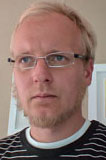 PhD candidate Anders Widmark is working on a doctoral project focusing on Pashto and Persian literature and language. Earlier (1996-98) he has been engaged in Indology studies (Sanskrit, Hindi, Classical Tibetean) at Stockholm University.
PhD candidate Anders Widmark is working on a doctoral project focusing on Pashto and Persian literature and language. Earlier (1996-98) he has been engaged in Indology studies (Sanskrit, Hindi, Classical Tibetean) at Stockholm University.
On Wednesday 6 April 2011, Anders Widmark lectures at a seminar organised by the Higher Seminar in Indology at Uppsala University. He willl speak on ”War and Conflict in Contemporary Pashtoo Short Stories”. Venue: Engelska Parken, room 9-3042. More information.![]()
Summer course on Ethnicity and Nation in the Near Orient
The Iranian Languages Division ran a 5 credits course on
Ethnicity and Nation in the Near Orient during the summer 2005. The
course focused on three ethnic groups in the region: Kurds, Pashtuns
and Balochis, and was administered by Dariush
Kargar. Carina
Jahani and Taj
Mohammad Breseeg lectured about Balochi Nationalism
and Ethnicity.
The two Swedish journalists/authors Stefan Lindgren and Nina
Hjelmgren are lecturing in the course on the Pashtun people and
the history of Afghanistan.
SASNET - Swedish South Asian Studies Network/Lund
University
Address: Scheelevägen 15 D, SE-223 70 Lund, Sweden
Phone: +46 46 222 73 40
Webmaster: Lars Eklund
Last updated
2011-03-16
